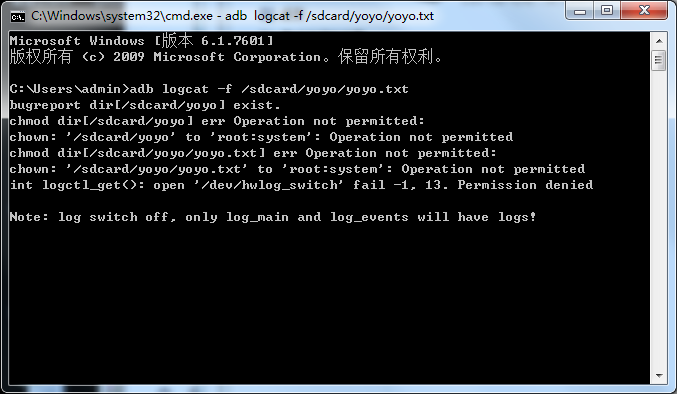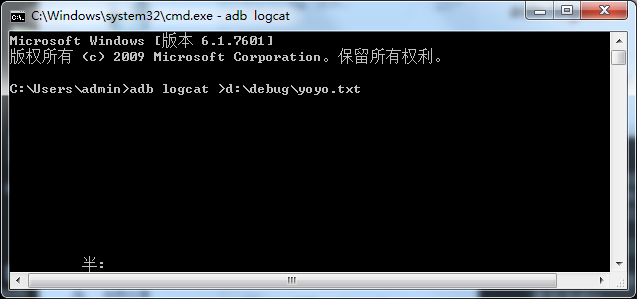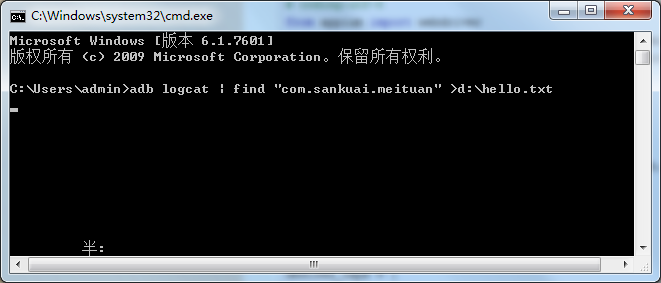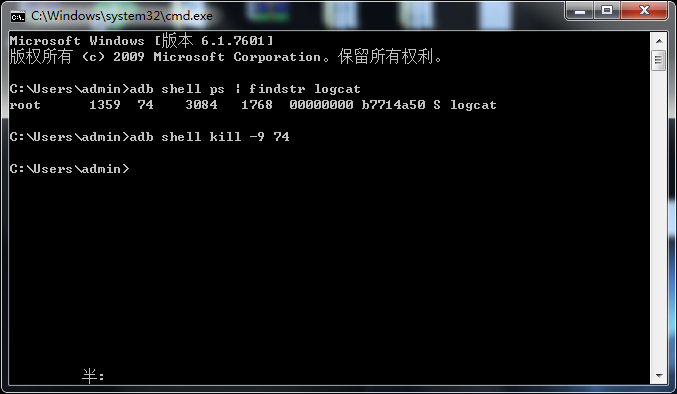前言
做app测试,遇到异常情况,查看日志是必不可少的,日志如何输出到手机sdcard和电脑的目录呢?这就需要用logcat输出日志了
logcat输出日志
1.把日志存入手机sdcard某个目录(前提是这个目录要是存在的)
adb logcat -f /sdcard/yoyo/yoyo.txt
备注:-f
上面这个指令在真机上(未root)是会报错的,提示没操作权限,在模拟器上可以执行

2.把日志存入电脑的某个目录,如d:\debug
adb logcat >d:debug\yoyo.txt

备注这里没-f, 不要问为什么
find过滤包名
1.如果直接用adb logcat抓日志的话,会把系统的一些其他无关紧要的都抓出来,如果只想抓取被测app的日志,那就根据包名过滤
adb logcat | find "com.sankuai.meituan" >d:\hello.txt

结束logcat
1.结束logcat抓包,可以用ctr+c快捷键结束, 这个是通过手工的快捷键操作完成
2.也可以先查询到logcat的pip,再kill掉
adb shell ps | findstr logcat
adb shell kill -9 [logcatpid]

help其它功能
1.cmd输入adb logcat -help可以查看其它功能
adb logcat -help
C:\Users\admin>adb logcat -help
Unrecognized Option h
Usage: logcat [options] [filterspecs]
options include:
-s Set default filter to silent.
Like specifying filterspec '*:S'
-f <filename> Log to file. Default is stdout
--file=<filename>
-r <kbytes> Rotate log every kbytes. Requires -f
--rotate_kbytes=<kbytes>
-z <conut> Sets max number of tarballs to <count>, default 5
-n <count> Sets max number of rotated logs to <count>, default 4
--rotate-count=<count>
-v <format> Sets the log print format, where <format> is:
--format=<format>
brief color epoch long monotonic printable process raw
tag thread threadtime time uid usec UTC year zone
-D print dividers between each log buffer
--dividers
-c clear (flush) the entire log and exit
--clear
-d dump the log and then exit (don't block)
-e <expr> only print lines where the log message matches <expr>
--regex <expr> where <expr> is a regular expression
-m <count> quit after printing <count> lines. This is meant to be
--max-count=<count> paired with --regex, but will work on its own.
--print paired with --regex and --max-count to let content bypass
regex filter but still stop at number of matches.
-t <count> print only the most recent <count> lines (implies -d)
-t '<time>' print most recent lines since specified time (implies -d)
-T <count> print only the most recent <count> lines (does not imply -d)
-T '<time>' print most recent lines since specified time (not imply -d)
count is pure numerical, time is 'MM-DD hh:mm:ss.mmm...'
'YYYY-MM-DD hh:mm:ss.mmm...' or 'sssss.mmm...' format
-g get the size of the log's ring buffer and exit
--buffer-size
-G <size> set size of log ring buffer, may suffix with K or M.
--buffer-size=<size>
-L dump logs from prior to last reboot
--last
-b <buffer> Request alternate ring buffer, 'main', 'system', 'radio',
--buffer=<buffer> 'events', 'crash', 'default' or 'all'. Multiple -b
parameters are allowed and results are interleaved. The
default is -b main -b system -b crash.
-B output the log in binary.
--binary
-S output statistics.
--statistics
-p print prune white and ~black list. Service is specified as
--prune UID, UID/PID or /PID. Weighed for quicker pruning if prefix
with ~, otherwise weighed for longevity if unadorned. All
other pruning activity is oldest first. Special case ~!
represents an automatic quicker pruning for the noisiest
UID as determined by the current statistics.
-P '<list> ...' set prune white and ~black list, using same format as
--prune='<list> ...' printed above. Must be quoted.
--pid=<pid> Only prints logs from the given pid.
--wrap Sleep for 2 hours or when buffer about to wrap whichever
comes first. Improves efficiency of polling by providing
an about-to-wrap wakeup.
filterspecs are a series of
<tag>[:priority]
where <tag> is a log component tag (or * for all) and priority is:
V Verbose (default for <tag>)
D Debug (default for '*')
I Info
W Warn
E Error
F Fatal
S Silent (suppress all output)
'*' by itself means '*:D' and <tag> by itself means <tag>:V.
If no '*' filterspec or -s on command line, all filter defaults to '*:V'.
eg: '*:S <tag>' prints only <tag>, '<tag>:S' suppresses all <tag> log messages.
If not specified on the command line, filterspec is set from ANDROID_LOG_TAGS.
If not specified with -v on command line, format is set from ANDROID_PRINTF_LOG
or defaults to "threadtime"